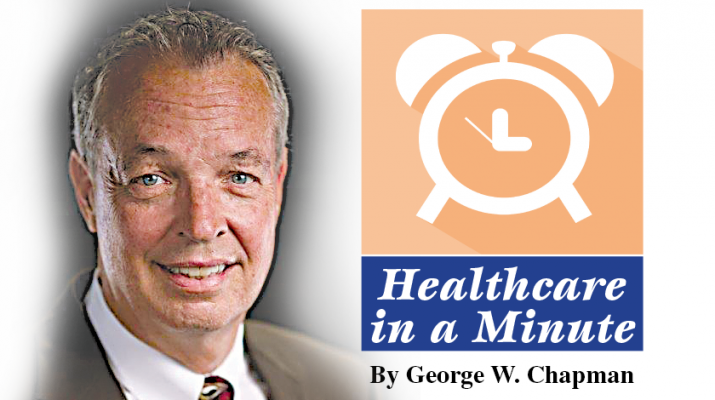By George W. Chapman
Hillary vs Donald. The Kaiser
Foundation conducted a poll last month to determine which candidate people believed would do a better job when it comes to healthcare. There were questions regarding women’s healthcare, the future of Medicare and Medicaid, the ACA, access, affordability, the cost of drugs, opioid abuse, Zika virus and AIDS. Clinton led Trump on basically every issue by double digits except the future of Medicare, which was almost even between the candidates. Two thirds of the respondents felt the top health priorities for both candidates should be the future of Medicare, access and affordability. When it comes to the Affordable Care Act, the poll was split 40 percent favorable and 42 percent unfavorable.
Hospital-owned physician practices.
About a quarter of medical practices are now owned by hospitals, according to a report by nonprofit advocacy group Avalere Health. Hospitals acquired 31,000 practices between 2012 and 2015, which is a 50 percent increase in activity over prior years. More than 140,000 physicians (40 percent of all physicians) were employed as of last year. This trend is greatest in the Midwest where almost 50 percent of physicians are employed. Advocates for private practices believe increasing regulations, costs and payment “reform” favor large systems of care and that smaller, independent practices will go the way of mom and pop stores.
Uninsured.
Through the first quarter of this year, about 27 million people or 8.6 percent of us are without health insurance. This is an historic low, down from 16 percent uninsured in 2010. Experts contend that the uninsured rate will go down very slowly from here on unless there is universal coverage.
Single payer system?
Public funding (tax dollars) is by far the dominant payer in healthcare. According to a study by the UCLA Center for Public Policy, public funds now account for 71 percent of the healthcare expenses in California. In addition to Medicare and Medicaid, tax dollars subsidize employer-sponsored insurance, insurance for public employees, and ACA tax credits for the indigent. (Premiums paid by employers and their workers are tax exempt so the authors of the study argue that these “forgone taxes” could be diverted to a single payer.) Of the total $3 trillion (figure $10,000 per person) in national spending, 65 percent is funded by taxpayers. The authors argue that since we are close to a single payer (government) why not consider one and how much the taxpayer money would save through far less red tape and tremendous purchasing power.
Low-value services.
These are medical services and diagnostic tests that, for the cost, have little benefit or use. Research published in JAMA Internal Medicine found that about 8 percent of us have received a low-value service. Among the most expensive low-value services are: spinal injections for lower back pain and imaging for headaches and lower back pain. While spending on unnecessary or over-used services has declined overall, it is still relatively high in employer-sponsored plans. Patients in consumer-directed plans were less likely to use low value services.
Largest HIPAA fine.
The Health Insurance Portability and Accountability Act protects your health information and privacy. Chicago-based Advocate Healthcare Network will pay the largest fine, $5.55 million, ever levied against a single entity. Four desktop computers containing information on almost 4 million people were stolen. The information included health, credit card, demographic and insurance information. The investigation by OCR (Office for Civil Rights) revealed widespread HIPAA noncompliance at Advocate.
Aetna challenged.
A letter to the Aetna CEO, signed by several US senators, challenges Aetna’s reason for withdrawing from the exchanges. Aetna seemed committed to continuing to participate in the exchanges up until the point where the Department of Justice started to push back on Aetna’s proposed merger with Humana. All of a sudden Aetna started to claim the exchanges were too risky. The senators accuse Aetna of basically threatening to pull out of the exchanges if their proposed merger with Humana is denied. Through the first half of this year, Aetna grew total revenues by 5 percent to reach $14 billion. Ironically, most of the increase in revenue was attributed to higher premium yields and membership growth — in its government business.
Quality hospitals save money, improve outcomes.
Medicare saves money when procedures are performed at higher quality hospitals. Medicare followed the overall costs resulting from five types of major surgery performed on 100,000 members. Outcome considered 30-day post-surgery mortality rates and patient experiences. The bottom line was Medicare saved an average $2,700 per patient when the surgery was performed at a high quality hospital. Most of the savings were attributed to less post-acute care like rehab and home health care.
Drink more water.
Water is now the No. 2 beverage of choice behind soft drinks. Water is critical for maintaining healthy body fluid levels which help with digestion, nutrient absorption, circulation, saliva production and body temperature. Water lowers calorie intake when substituted for soft drinks. It energizes muscles. We should drink two glasses before exercise as well as during and after. Water keeps your skin looking good. It helps your kidneys function efficiently. Finally, water keeps you “regular.”
George W. Chapman is a healthcare consultant who works with hospitals and medical groups. He operates GW Chapman Consulting based in Syracuse. Email him at gwc@gwchapmanconsulting.com.

